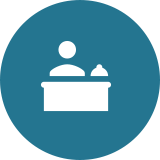
Over the course of our Medical Office Assistant and Unit Clerk Certificate, students will be provided the necessary skills and theoretical knowledge needed to become competent and confident unit clerks and medical office assistants.
Students will receive a Certificate in Medical Office Assistant and Unit Clerk upon completing all requirements.
Figures represent the 2022/2023 period and are sourced from the 2021 Alberta Wage and Salary Survey.
Figures represent the 2022/2023 period and are sourced from the 2021 Alberta Wage and Salary Survey.
Classes start every month!
MODULAR BASED SYSTEM:
A modular-based curriculum delivery approach presents a flexible and adaptable educational framework, catering to individual learning needs and enhancing student engagement through relevant, hands-on content. By allowing sequential advancement, it ensures a solid foundation, efficient resource utilization, and increased accessibility, particularly in remote learning environments.
With an emphasis on critical thinking, problem-solving, and self-directed learning, modular-based curricula prepare students for the challenges of a rapidly changing world, while also fostering consistency and standardization on a global scale.
MODE OF DELIVERY:
1. Blended (Virtual classes along with onsite practicum and workshops)
2. On-Site (Classes held in the Calgary, Red Deer and Cold Lake Campuses – Monday to Friday) contact our Admissions team for detailed information.
All applicants must meet with an MCG Career College Admissions team representative.
Standard Admission:
Mature Admission:
Students must meet the English language requirements through ONE of the following:
Standard First Aid with CPR Level C and AED
Students are required to provide proof of completion of the Standard First Aid with CPR Level C and AED course. Students need to maintain current certification throughout the diploma including practicum.
Upon successful completion of the Medical Office Assistant & Unit Clerk Certificate, graduates will be qualified to assist healthcare professionals in medical offices and other healthcare facilities.
Tuition Costs:
|
$11,564.00 |
Tuition |
|---|---|
|
$400.00 |
Books |
|
$300.00 |
Supplies |
|
$12,264.00 |
Total |
International Students:
|
$15,000.00 |
Tuition |
|---|---|
|
$400.00 |
Books |
|
$300.00 |
Supplies |
|
$15,700.00 |
Total |
[For international students and domestic students there is a non-refundable application fee of $500.00]
The Medical Office Assistant and Unit Clerk program is a comprehensive training program designed to prepare students for careers in healthcare administration. It combines the skills required for medical office administration and unit clerk roles.
Medical Office Assistants manage administrative tasks in medical settings, such as scheduling appointments, maintaining patient records, and billing. Unit Clerks are responsible for coordinating communication within healthcare units, including managing patient charts, orders, and supporting healthcare providers.
Some programs include internship or practicum components, allowing students to gain real-world experience in medical offices or healthcare units, which can be valuable for building skills and securing future employment.
To enroll, you can typically apply through the institution's admissions process. Contact the institution offering the program for specific enrollment details and requirements.
Yes, there is a consistent demand for skilled healthcare administrators. The healthcare industry relies on efficient administrative support to ensure the smooth operation of medical facilities and patient care.
Electronic Medical Management
Effective, efficient, and standardized management of healthcare records and patient scheduling is vital to the smooth operation of a healthcare facility. Students will examine scheduling concepts, workflow management, organization of the electronic patient chart, and healthcare billing.
Ethics and Law in Healthcare
Students will be introduced to two major privacy acts in Canada as well as the Health Information Act as it pertains to the client and administrative healthcare environment. Ethical, moral, and legal discussions will include patient rights, chart ownership and management, and ethical decision-making processes. Emphasis will be placed on the importance of patient confidentiality and obtaining patient consent.
Healthcare Communications
Accurate, professional, and self-assured communication is key in a healthcare environment. To achieve this, learners will be guided in the development of professional written and verbal communication. Learners will explore email communication, telephone, interpersonal skills and job-hunting skills. Students will also develop their abilities in creating word processing and spreadsheet documents through online and in-class activities.
Medical Office Assisting
Tasks within the medical office can differ from clinic to clinic. This course will build the student’s knowledge by exploring the concerns of patients, understanding cultural difference in healthcare and reviewing safety and standard precautions. Students will learn skills and build confidence in both dealing with emergencies within the clinic and the collection of patient vitals.
Medical Terminology, Anatomy & Pharmacology
Understanding medical terminology is essential to communication within a medical office or hospital unit. This course will familiarize students with medical root words, prefixes, and suffixes. Students will then construct and deconstruct terms related to body systems. Basic anatomy and pharmacology terms will also be covered to assist in the practical use of the medical language.
Unit Clerk Procedures
This course will introduce students to the organizational structure of a hospital setting and the professional roles that exist within the healthcare environment. Emphasis will be placed on the role of the unit clerk as a vital member of the patient-care team. Topics covered will also include reviewing the hospital chart, patient confidentiality, and the importance of accuracy within the order documentation process.